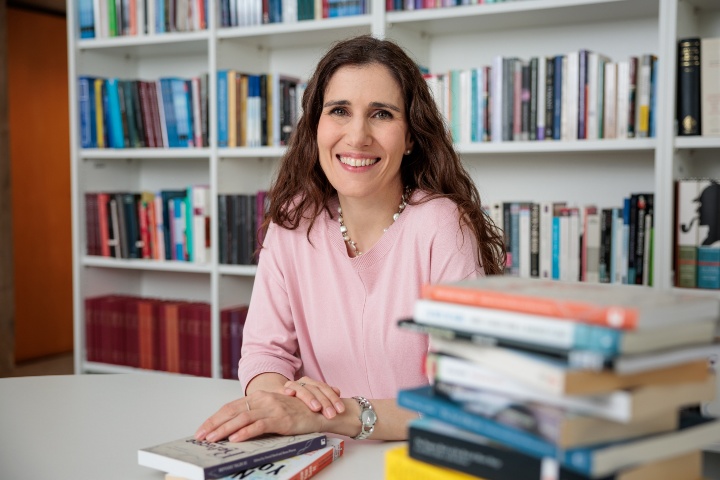Professor Sibylle Baumbach, a literary scholar at the University of Stuttgart, aims to explore how short prose captures, influences, and improves attention. Through her project "LitAttention," she delves into the concept of "literary attention" using an interdisciplinary approach. The European Research Council (ERC) is funding the project with up to 2.5 million euros as part of an ERC Advanced Grant.
"I am delighted that Sibylle Baumbach has been awarded this funding. With the Advanced Grant, the ERC is recognizing her many years of exemplary research work," explains Prof. Manfred Bischoff, Vice Rector for Research and Early Career Researchers at the University of Stuttgart. "With her ‚LitAttention‘ project, she is tackling a highly topical subject in the field of attention research, positioned at the interface between literary and cultural studies, educational psychology and computational linguistics. This initiative exemplifies the collaborative, interdisciplinary approach championed by the Stuttgart Way," emphasizes Vice Rector Bischoff.
Attracting and training attention
From detective stories such as "Sherlock Holmes" to microfiction such as twitterature ("Twitter literature"): Short prose, especially the short story, must captivate its readers much more quickly and intensely than a novel, for example. At the same time, it can attract attention quickly and for a period of time that fits well into an accelerated daily routine. "In view of increasing fears regarding possible attention deficits in children and young people, short stories can work in two directions," explains Sibylle Baumbach, Professor of English Literatures and Cultures at the University of Stuttgart’s Institute of Literary Studies (ILW). "Short stories are not only especially suitable for attracting and training attention. Above all, they can sensitize us to the means by which texts and media direct, distract, shape and manipulate our attention."
Identifying stylistic devices and strategies
As part of the "LitAttention" project, Sibylle Baumbach aims to investigate how short stories in particular have shaped public debate about attention at different times and how the knowledge that this literary form brings us about dealing with attention can be used today. In addition, she also wants to identify which literary and linguistic stylistic devices, strategies and effects the authors of short stories prefer to use in order to specifically promote attention. Among other things, the project demonstrates that concerns that emerging media and developments in communication technology will have a negative impact on concentration is not a phenomenon only common to the digital age. "There were similar fears in the 19th century, when the short story experienced its first boom and the first magazines and films appeared," says the expert.
Developing interdisciplinary approaches
Sibylle Baumbach combines classical methods from literary studies with methods from cognitive and educational sciences and computational linguistics as part of her interdisciplinary approach. With her team, she wants to examine short texts of different genres, including detective and horror stories, but also microtexts such as Twitter or Instagram stories, and analyze whether and how they manage to attract and bind our attention. Building on this, "LitAttention" aims to define specific attention parameters for the development of new computational linguistic models. In future, these could be used to analyze much larger volumes of text, providing information about literary attention.
Using literary attention in schools
With her ERC project, Sibylle Baumbach not only wants to establish a new scientific approach to researching literary attention, but also develop strategies to put this to use in school lessons and strengthen literature as a whole in the curriculum. "I am convinced that short prose in its various forms can do a lot in the digital world to raise awareness of attention strategies and promote attention. We have thus far underutilized this potential."
About Professor Sibylle Baumbach
Sibylle Baumbach has been Professor of English Literatures and Cultures at the Institute of Literary Studies at the University of Stuttgart and head of the same department since 2018. She previously taught English Literatures and Cultures at the Universities of Innsbruck, Giessen and Mainz and was a Fellow of the Humboldt Foundation at Stanford University. Baumbach has been President of the German Shakespeare Society since 2023. In addition to literary attention and British drama, she also researches the history of fascination.
About the ERC Advanced Grant
The ERC Advanced Grant is one of the most prestigious research awards in the world. This research grant from the European Research Council (ERC) is designed to support highly accomplished researchers of any nationality who have demonstrated exceptional scientific achievements. It enables them to pursue projects with the potential to achieve significant scientific breakthroughs. The last ten years prior to the application are decisive for the assessment of scientific performance. From a total of 1,829 applications, just 255 were approved. The funding amounts to a total of almost 652 million EUR and is part of the EU's "Horizon Europe" program.
Further information
Are you looking for qualified contacts in a specific subject area? In the University of Stuttgart's Expert Service you will find academics who can support you in your research.
Expert Contact:
Prof. Sibylle Baumbach, University of Stuttgart, Department of English Literatures and Cultures, Institute for Literary Studies, Tel.: +49 711 685-83100, email
Contact

Jutta Witte
Dr.Scientific Consultant



